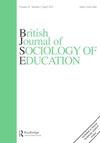运气好吗?10至21岁工薪阶层年轻人生活中的运气和教育流动性
IF 2.1
3区 教育学
Q1 EDUCATION & EDUCATIONAL RESEARCH
引用次数: 0
摘要
社会学很少关注运气在社会流动/再生产中的作用。这篇论文借鉴了对20名工薪阶层年轻人及其22名父母在11年的时间里进行的200多次纵向采访,从10岁到21岁,有助于解决这一概念差距。我们在13名具有教育流动性的年轻人、6名与父母教育水平相似的年轻人和1名地位不太明确的年轻人的轨迹中探索了运气的潜在意义。我们的分析表明,特定形式的运气可能有助于创造社会流动的机会,尽管这些机会的后果是通过代理、结构、习惯和资本的相互作用来调节的。我们的结论是,进一步关注运气可能有助于增强社会学对结构/代理的理解,以及布迪厄对社会再生产的理解。本文章由计算机程序翻译,如有差异,请以英文原文为准。
Get lucky? Luck and educational mobility in working-class young people’s lives from age 10–21
Abstract Scant sociological attention has been given to the role of luck within social mobility/reproduction. This paper helps address this conceptual gap, drawing on insights from over 200 longitudinal interviews conducted with 20 working-class young people and 22 of their parents over an 11-year period, from age 10–21. We explore the potential significance of luck within the trajectories of 13 educationally mobile young people who were the first in family to go to university, six young people who achieved similar educational levels to their parents and one young person whose status was less clear cut. Our analysis suggests that particular forms of luck may be instrumental in creating opportunities for social mobility, although the consequentiality of these are mediated through interplays of agency, structure, habitus and capital. We conclude that paying further attention to luck may help augment sociological understandings of structure/agency and Bourdieusian understandings of social reproduction.
求助全文
通过发布文献求助,成功后即可免费获取论文全文。
去求助
来源期刊
CiteScore
3.70
自引率
9.50%
发文量
74
期刊介绍:
British Journal of Sociology of Education is one of the most renowned international scholarly journals in the field. The journal publishes high quality original, theoretically informed analyses of the relationship between education and society, and has an outstanding record of addressing major global debates about the social significance and impact of educational policy, provision, processes and practice in many countries around the world. The journal engages with a diverse range of contemporary and emergent social theories along with a wide range of methodological approaches. Articles investigate the discursive politics of education, social stratification and mobility, the social dimensions of all aspects of pedagogy and the curriculum, and the experiences of all those involved, from the most privileged to the most disadvantaged. The vitality of the journal is sustained by its commitment to offer independent, critical evaluations of the ways in which education interfaces with local, national, regional and global developments, contexts and agendas in all phases of formal and informal education. Contributions are expected to take into account the wide international readership of British Journal of Sociology of Education, and exhibit knowledge of previously published articles in the field. Submissions should be well located within sociological theory, and should not only be rigorous and reflexive methodologically, but also offer original insights to educational problems and or perspectives.

 求助内容:
求助内容: 应助结果提醒方式:
应助结果提醒方式:


